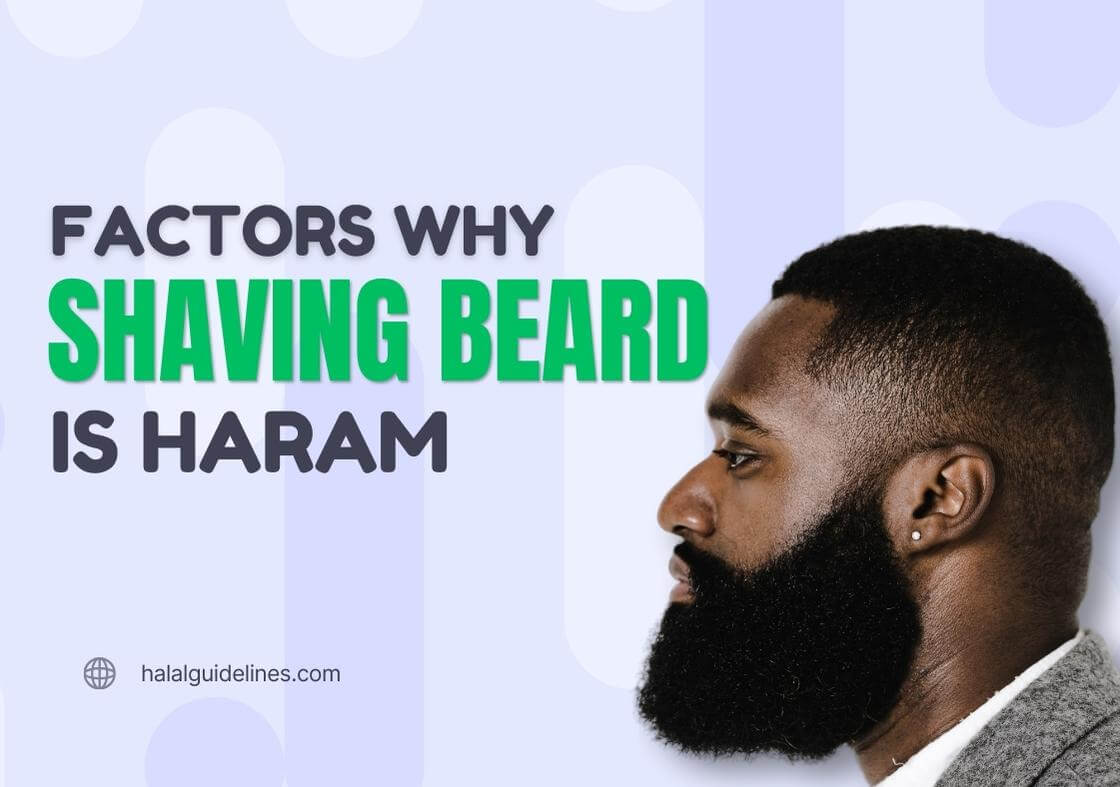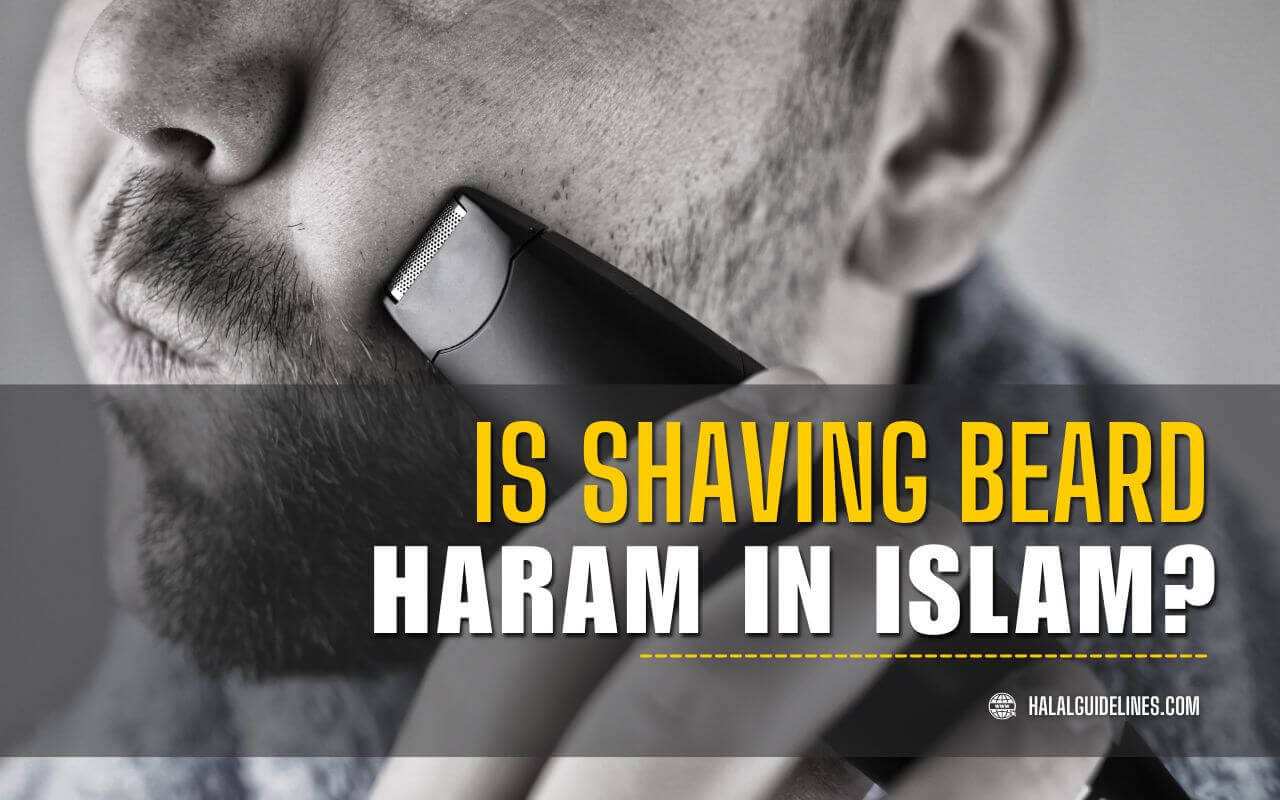By keeping our beards, we Muslim men show our commitment to these values and respect for the traditions passed down through generations. That is why we are encouraged not to shave our beards and instead hold this important part of our faith.
6 Factors Why Shaving Beard is Known as Haram Act in Islamic Law

The beard is an important part of Islamic tradition, representing faith and commitment to religious beliefs. For Muslim men, the decision to keep or shave their beard goes beyond just personal style it is a serious religious matter. Shaving the beard is often seen as a haram act in Islam for several important reasons.
The reasons below can help you highlight the significance of maintaining a traditional beard:
1. Following the Prophet’s Words:
The Prophet Muhammad (S.A.W) clearly told men to grow beards and trim mustaches. This instruction is found in many authentic Hadiths (sayings of the Prophet). Muslims believe that following these words is a way to obey Allah and earn His pleasure. It’s not just about looks, but about showing obedience to religious teachings.
2. Looking Like the Prophet:
The Prophet Muhammad had a beard, and Muslims tried to follow his example (Sunnah) in many aspects of life. This is not just about copying his appearance, but about following a way of life that he taught. Many Muslims believe that by keeping a beard, they’re honoring the Prophet’s memory and teachings.
3. Standing Out as a Muslim:
Historically, the beard has been a way for Muslim men to show their identity. In a world where Muslims often live alongside people of other faiths, the beard can be a visible sign of one’s beliefs. It is like wearing a sign of faith, showing pride in being Muslim, and inviting others to learn about Islam.
4. Keeping What Allah Gave:
Islam teaches that Allah created everything perfectly. Many Muslims see the ability to grow a beard as part of Allah’s design for men. They believe that shaving it off might reject or alter this divine gift. By keeping the beard natural, Muslims express their appreciation and respect for Allah’s creation.
5. Being Modest and Manly:
In our culture, we often associate the beard with modesty and masculinity. It serves as a natural way for men to cover part of their faces, promoting modesty. At the same time, people view it as a sign of maturity and manhood. Many consider growing a beard a way to uphold these important Islamic values.
6. Fitting In with Other Muslims:
In many Muslim communities, having a beard is the norm. It creates a sense of brotherhood and belonging. Shaving might make someone feel out of place or even face criticism from others. Keeping a beard can help a Muslim man feel more connected to his community and shared values.
The belief that shaving the beard is haram stems from various factors we have discussed above. By keeping their beards, Muslim men express their commitment to their faith and honor the teachings passed down through generations.
Read more interesting articles like:
Quran and Hadith Guidance For Muslims To Clear Confusion
The question of keeping a beard in Islam often leads to confusion among Muslims. Many seek clear guidance from the primary sources of Islamic teachings the Quran and Hadith. These sources provide awareness that can help Muslims understand the importance of the beard in our faith.
Hadith Guidance On Shaving Bread
There are several Hadiths that more directly address the issue of beards.
Ibn Umar narrated that the Prophet (peace be upon him) said:
خَالِفُوا الْمُشْرِكِينَ، وَفِّرُوا اللِّحَى، وَأَحْفُوا الشَّوَارِبَ
Translation: Do the opposite of what the pagans do. Keep the beards and cut the mustaches short.
Reference: Sahih al-Bukhari 5892

This Hadith clearly instructs Muslim men to grow beards. It’s seen as a way to follow the Prophet’s teaching and to have a distinct Muslim identity.
Quran Guidance To Follow the Prophet Footsteps
While the Quran does not directly mention beards, it points out the following example of Prophet Hazrat Muhammad (S.A.W).
مَّآ أَفَآءَ ٱللَّهُ عَلَىٰ رَسُولِهِۦ مِنْ أَهْلِ ٱلْقُرَىٰ فَلِلَّهِ وَلِلرَّسُولِ وَلِذِى ٱلْقُرْبَىٰ وَٱلْيَتَـٰمَىٰ وَٱلْمَسَـٰكِينِ وَٱبْنِ ٱلسَّبِيلِ كَىْ لَا يَكُونَ دُولَةًۢ بَيْنَ ٱلْأَغْنِيَآءِ مِنكُمْ ۚ وَمَآ ءَاتَىٰكُمُ ٱلرَّسُولُ فَخُذُوهُ وَمَا نَهَىٰكُمْ عَنْهُ فَٱنتَهُوا۟ ۚ وَٱتَّقُوا۟ ٱللَّهَ ۖ إِنَّ ٱللَّهَ شَدِيدُ ٱلْعِقَابِ
Translation: As for gains granted by Allah to His Messenger from the people of ˹other˺ lands, they are for Allah and the Messenger, his close relatives, orphans, the poor, and needy travellers so that wealth may not merely circulate among your rich. Whatever the Messenger gives you, take it. And whatever he forbids you from, leave it. And fear Allah. Surely Allah is severe in punishment.
Reference: Surat Al-Hashr (59:7)

The last part of this verse tells us Muslims that we should follow what the Prophet Muhammad taught and avoid what the Prophet forbids. Since the Prophet instructed men to grow beards, many Muslims view this verse as indirect support for keeping a beard.
These sources from the Quran and Hadith help explain why many Muslims believe keeping a beard is important in Islam. They show that it is not just about looks, but about following our religious teachings.
Islamic Scholars Speak About the Importance of Beards
The question of shaving beard has been a topic of serious discussion among Islamic scholars throughout history. A significant majority of respected scholars from various Islamic schools of thought conclude that Muslim men should not shave their beards, deeming it haram (forbidden). Their rulings, based on careful study of Islamic texts and traditions, provide important guidance for Muslims.
Dr. Naik also explains that while obeying parents is very important in Islam, if parents ask their son to shave his beard, he should politely explain that keeping a beard is a religious duty. But, if a job requires a Muslim to shave his beard, Dr. Naik advises that it is better to look for another job that allows him to keep his beard, even if it means earning less money.
You can listen to his wording in this video below:
Sheikh Assim states that growing a beard is mandatory (Wajib), and all four major Islamic schools of thought Hanafi, Shafi’i, Maliki, and Hanbali—consider shaving it completely forbidden (Haram). Keeping a beard stems from the practices of the Prophet Muhammad and his companions. Although neglecting it does not make one sinful, following this Sunnah remains important.
Watch his video below:
Here is the video below of him:
In light of these scholarly opinions, many Muslims choose to grow and maintain their beards as an act of faith, seeing it not just as a personal choice, but as an important aspect of following Islamic principles in their daily lives.
Further FAQs Related to Shaving Your Beard
Is trimming the beard haram, or is only shaving forbidden?
Shaving the beard completely is considered haram, but trimming it to maintain a neat appearance is generally permissible. So, it would help if you kept the beard at a length that aligns with the Sunnah, typically a fist’s length.
What is the punishment for shaving your beard?
On the Day of Judgment, Allah will hold those who shave their beards accountable, but He alone will decide if to punish them. He will consider their intentions, knowledge, and overall deeds.
What if I’m facing significant social pressure to shave my beard?
Islam encourages you to uphold your religious obligations despite social pressure. Although it can be challenging, maintaining your beard is an important act of faith and allegiance to Islamic teachings.
Is shaving the beard haram or makruh?
Scholars mostly consider shaving the beard haram (forbidden) because it goes against the teachings of the Prophet Muhammad (peace be upon him). Some view it as makruh (discouraged), but the general belief is that keeping a beard is important in Islam.
Final Thoughts on Keeping a Beard
Dear brothers, keeping a beard is a significant way to express our faith and follow the teachings of Hazrat Muhammad (peace be upon him). It symbolizes our commitment to Islamic values and helps us proudly identify as Muslims.
By maintaining our beards, we honor the traditions passed down through generations, connecting us to our history and community. This practice reminds us to uphold the Sunnah and reflect on our character, kindness, honesty, and humility.
May Allah guide us on the right path and grant us the strength to live according to His teachings. Let us grow our faith and encourage others, showing the beauty of Islam in how we live each day.







